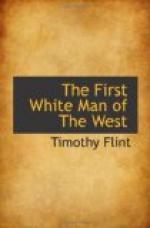All attempts of the General Government to pacify the Indians, having proved ineffectual, an expedition was planned against the hostile tribes north-west of the Ohio. The object was to bring the Indians to a general engagement; or, if that might not be, to destroy their establishments on the waters of the Scioto and the Wabash. General Harmar was appointed to the command of this expedition. Major Hamtranck, with a detachment, was to make a diversion in his favor up the Wabash.
On the 13th of September, 1791, General Harmar marched from Fort Washington, the present site of Cincinnati, with three hundred and twenty regulars, and effected a junction with the militia of Pennsylvania and Kentucky, which had advanced twenty-five miles in front. The whole force amounted to one thousand four hundred and fifty-three men. Col. Hardin, who commanded the Kentucky militia, was detached with six hundred men, chiefly militia, to reconnoiter. On his approach to the Indian settlements, the Indians set fire to their villages and fled. In order, if possible, to overtake them, he was detached with a smaller force, that could be moved more rapidly. It consisted of two hundred and ten men. A small party of Indians met and attacked them; and the greater part of the militia behaved badly,—leaving a few brave men, who would not fly, to their fate. Twenty-three of the party fell, and seven only made their escape and rejoined the army. Notwithstanding this check, the army succeeded so far as to reduce the remaining towns to ashes, and destroy their provisions.
On their return to Fort Washington, Gen. Harmar was desirous of wiping off, in another action, the disgrace which public opinion had impressed upon his arms. He halted eight miles from Chillicothe, and late at night detached Col. Hardin, with orders to find the enemy, and bring them to an engagement. Early in the morning this detachment reached the enemy, and a severe engagement ensued. The savages fought with desperation. Some of the American troops shrunk; but the officers conducted with great gallantry. Most of them fell, bravely discharging their duty. More than fifty regulars and one hundred militia, including the brave officers, Fontaine, Willys, and Frothingham, were slain.




